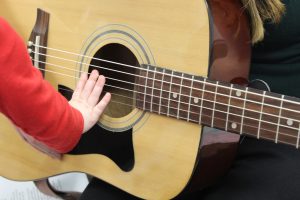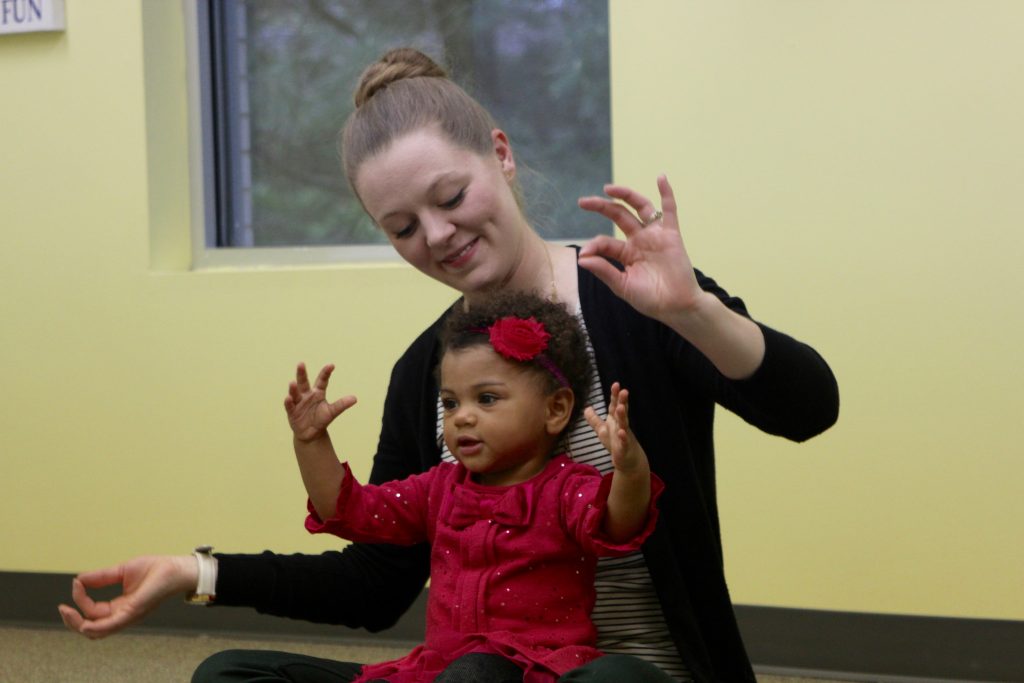by Alisabeth Hopper | Apr 6, 2017 | MTC
This may not be the most pleasant signs but they are so very important! Whether you’re a Music Therapist working with clients, patients, and students who may be nonverbal, deaf, or hard of hearing, or if you are a parent who wants to give your little one the ability to express their aches and pains. These are incredible useful signs for all!
In the video you will learn signs for stomach ache, tooth ache, sick, and even dizzy! These are descriptive and very helpful in trying to understand an individuals behavior or emotional distress. Having the ability to say “I feel dizzy” or “I have a stomach ache” are priceless skills for all of us regardless of our age or abilities.
by Katey Kratz | Mar 23, 2017 | MTC
We are so incredibly fortunate to have such a well-rounded, incredibly talented, and diverse group of musicians teaching lessons and providing therapy services at Music Therapy Connections. Not only do each of our teachers provide lessons to a large number of students each week, they are also all involved in their own musical projects. Every one of our teachers has been involved in a large variety of musical endeavors throughout their careers and most are still actively involved in making music outside of the lesson room and in the public arena.

While Katey, Kristi, and Reid are all involved in local or touring bands, Rachel continually creates amazing resources and songs, Matt Nall and Melissa provide worship/praise music, Alisabeth is involved with the Springfield Choral Society, Matt Mifflin performs in a solo and group capacity, and Becky compose music. Our entire team is making music, for so many reasons, in a variety of styles, and across a large span of settings. By participating in making music, we each are learning and growing in our own way, making us all better teachers and services providers through our individual experiences.
You can read about each of our teachers and their music education, experience, and expertise on our about page: https://musictherapyconnections.org/about-us/.
This week, we want to give special recognition to Kristi Lecocq who is celebrating the release of the second album with her local band, The Fireside Relics. They will be performing on Friday, March 24th at Capital City Bar & Grill in Springfield, IL to celebrate the release of the album. We are so thrilled for Kristi and all of the members of Fireside Relics and hope you enjoy their new album.

https://www.reverbnation.com/thefiresiderelics/songs
I hope, if you have the chance, you will take a minute to listen to one of the new songs on Kristi’s album or check out any of the other incredible projects our team members is involved in. We’ll be sure to share more music projects or ways you can support music in our community and studio as they happen.
by Alisabeth Hopper | Feb 20, 2017 | MTC
Hey all!
This week in Sign Language & Music we explored numbers 1-10 in sign language. I mentioned that I often use number signs 1-31 in calendar time for many of my sessions. The numbers 1-10 are a great start to learning all of those number signs!
So heres the big question… Do I use signed numbers, or standard finger counting?
This really depends on what your classroom, students, or clients are using. If they have been using and gaining understanding with standard counting then that might be the most appropriate counting measure to use. Many of my classrooms use signed numbers so I use those to reiterate the method that is already being used in the classroom. At the end of the day I am always in search of the most efficient and effective means to the end. Check out this weeks video below, and have a wonderful week!
-AH
by Sammy | Feb 10, 2017 | MTC
Overcoming anxiety is hard. It’s a constant struggle for me and probably for many other people in the music therapy profession. Sometimes, as horrible as it is, my personal anxiety can carry over into my music therapy practice, especially when there is a lot on my plate. It’s happened a lot this past week and I am becoming more aware of it. I have been learning in my internship how to effectively deal with anxiety, both personal and clinical, and I’d love to share my reflections and thoughts with you today!
You’ve probably heard about the “hats” metaphor that people use to describe themselves in different situations. There’s the music therapy hat, the personal hat, and any other hat that may apply to your life. In order to deal with anxiety, I’ve been practicing wearing just my music therapy hat when I’m at my internship. In order to do this, I found it beneficial to stay in the moment. By staying in the moment, I avoid thinking about everything that I have to get done after a session or otherwise. Also, this is beneficial to the client because then I am focusing completely on them and their needs.
If I have time before I go into a session and I’m feeling anxious for whatever reason, I take five minutes to just relax and think about my “happy” place. This gets me prepared and less anxious. If I don’t have time when transitioning between clients at my internship, I like to take a drink of my water, take a deep breath, and visualize myself doing something that I love (even if it’s for a short thirty seconds). When I don’t take a moment for my brain to relax, my tensions can carry over into the next session, which is not the best option for anyone.
Overcoming anxiety is a process and if I continually work towards handling it effectively, it will become easier.
What are some ways you overcome anxiety and minimize it’s effect on your life?
Sammy Springer
by Alisabeth Hopper | Jan 17, 2017 | MTC

Chances are, if you have found this post you may have heard of music therapy. That is great! As music therapists we are very passionate about what we do and how it can be effective for people of all ages and abilities! If you would like to know more, please follow the link here to learn more. Today we are going to dive into a specific population or group of people and how music therapy is often effective for them! We are going to talk about Autism.
Autism also know as Autism Spectrum Disorder or ASD. A child or adult with Autism may have some delay to any varying degree of social skills, and speech skills in addition to varying sensory needs and sensitivities. Here is an example of how we would address the following,
Social Delay- This can vary from reflecting on the lyrics of a song to bring the client into a greater awareness of how others feel and express themselves to simply making and maintaining eye contact.
Speech Delay- Speech delays can range from entirely nonverbal to a stutter or using mostly abbreviated phrases. A music therapist can utilize rhythmic techniques to improve stuttering and song analysis to increase developmentally appropriate complex speech.
Sensory Needs- Like most aspects of this topic sensory needs also fall on a spectrum. What we often see is the ability to regulate sensory needs or the struggle to do so. For instance, if you are in a room where there is a sound or light which you find irritating or distracting… what do you do? Well, more than likely you may try to turn off the sound or light and if you can’t, then you may choose to leave. Many people with ASD not only are more sensitive than most people to sound, touch, light, etc. But when a sensory overload starts to happen they may not have the coping skills necessary to alleviate the problem. This is often where we see misplaced behaviors.
That being said, as music therapists we have a special perspective and influence when it comes to sensory needs. Music therapy utilizes varied techniques to cater to sensory needs while creating a great environment for increasing and improving speech, social skills, academic skills, life skills, and more. I often get asked “but isn’t music therapy loud?” No, not in many cases it truly depends of what is best for our client. As music therapy we practice an understanding of sensory needs practical for many different clients. We are aware that clients can be sensitive and are kind and gentle when finding volumes, instruments, and timbres of preference.
Are you interested in music therapy for you or someone you know?

Here are a few resources on Autism and music therapy,
Autism Speaks
American Music Therapy Association on Music Therapy and Autism
If you have any questions, contact us at info@musictherapyconnections.org.
-AH
by Alisabeth Hopper | Jan 12, 2017 | MTC

Hello All,
I love using these signs as an alternative to farm animals. If we’re all being honest, sometimes a little change from “Old MacDonald had a… Cow!” is very welcomed. It is also a fantastic opportunity to learn animals that a child, student, or client may now have been challenged with yet! Enjoy and watch for next week’s video!
-AH






